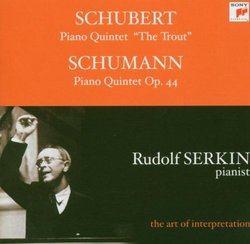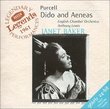| All Artists: Franz [Vienna] Schubert, Robert Schumann, Rudolf Serkin Title: Schubert: Piano Quintet ("The Trout"); Schumann: Piano Quintet, Op. 44 Members Wishing: 0 Total Copies: 0 Label: Sony Bmg Europe Original Release Date: 1/1/2003 Re-Release Date: 9/1/2003 Album Type: Import, Original recording remastered Genre: Classical Styles: Chamber Music, Historical Periods, Classical (c.1770-1830) Number of Discs: 1 SwapaCD Credits: 1 |
Search - Franz [Vienna] Schubert, Robert Schumann, Rudolf Serkin :: Schubert: Piano Quintet ("The Trout"); Schumann: Piano Quintet, Op. 44
 | Franz [Vienna] Schubert, Robert Schumann, Rudolf Serkin Schubert: Piano Quintet ("The Trout"); Schumann: Piano Quintet, Op. 44 Genre: Classical
|
Larger Image |
CD DetailsSimilar CDs |
CD ReviewsA FINE CATCH DAVID BRYSON | Glossop Derbyshire England | 03/03/2005 (5 out of 5 stars) "Without explicit confirmation, I can't be sure whether these performances from the 60's have been remastered. I don't think, in all honesty, that the sound is any better than on the LP's. That was perfectly respectable in any case, and so it remains. The important thing is to have these performances available to us again. My experience suggests that it would take some research to find a bad performance of the Trout quintet. This one is first-class, but first-class in a pool consisting of little else. Everything is alert and meticulous, the players' joy in the music apparent from start to finish. The point of performances from Marlboro was that the performers were not there primarily to give concerts - what they performed was a by-product of their preparation and study of the music, and the concerts happened when a)they thought they were ready to offer a public performance, and b)when Serkin thought so too. The special feel is here as usual, a mixture of care and spontaneity, and how one reacts to this performance is more a matter of each listener's temperament than of any supposedly objective evaluation. Those who already know Serkin's Schubert (what little of it he played) will know to expect a certain amount of high seriousness as well as more gemuetlich aspects. There is plenty of sparkle here, but this is a fairly heavyweight account in some ways too, rather like Richter's in that respect. The `Trout' theme itself is given thoughtfully, the tempo on the slow side for andantino. I for one don't consider innocent Viennese warbling to be adequate as an approach to this most divinely gifted of all composers, even in this work, and this is a top-flight version by any standard. That said, if you want the 6-star version I still think the one to go for is the one with Curzon at the piano, supposing you can still find it. This is the Schumann quintet of my dreams. Again there is a very strong field, but this is the way of doing it that I respond to more than I do to any other. The piano dominates the work to an extraordinary extent - I think it is playing in every bar from beginning to end - so the main question is how one reacts to the piano-playing. This is Serkin at his most out-and-out characteristic. His highly individual touch, crisp and forceful with a special punch and definition to the rhythm, characterises the whole performance. I simply adore the special way he had of snatching at the strong beats in emphatic passages, such as the central episode of the march. He has a way of making other players sound insipid. Naturally, there is a lot more than that to it. Serkin was a chamber player turned soloist, and he has the feel of chamber music in his bones. The main section of the march has great solemnity and sadness. The lyricism is echt-Schumann for me, soulful, spontaneous and heartfelt. The ensemble and balance are perfection. The articulation of the phrases in the development section of the first movement is a thing to live for. However the greatest moment of all is the very start, Schumann over the moon with gladness and relief at returning to his beloved piano after a spell elsewhere with the songs. A more specialised pleasure is the liner-note, apparently from a French original translated by someone or something called `Interword (Paris)'. Whether this is an alias for Hyman Kaplan, or proof of Martian infiltration, I wouldn't know, but a more baffling specimen of English as she is spoke I have not seen in many a long year. It can be enjoyed in its own right, and whatever it is trying to say is superfluous. These performances speak grandly and eloquently for themselves." Brilliant imagination; innate power! Hiram Gomez Pardo | Valencia, Venezuela | 06/05/2006 (5 out of 5 stars) "
Perhaps, the most striking argument in what concerns to Schumann's artistic integrity has been the critical complaint over the absence of virtuoso fireworks. It's too easy to notice almost all of his works for piano lacked that brand of pyrotechnics. It' s well known that 1841 has been considered "the chamber music year" for Robert Schumann. Three strings quartets Op. 41, the Piano Quartet Op. 47, the Fantasiestucke for Piano, violin and violoncello Op. 88 and the Piano Quintet, seem to prove it. I find personally that the Piano Quintet Op. 47 is his most polished and structurally Opus in this genre. Its gorgeous beauty and the superb balance between the piano and strings deserve for this work a status place among the best compositions for this combination. So we have arrived at last to possibly the most famous and beloved piano quintet ever composed, better known as "The Trout" . Serkin makes a competent performance although this is not the best expressive version. This Quintet exemplifies as any other piano quintet not only a radiant and exuberant lyricism; its profound musicality filled with that accented Shubertian scent loaded of perky innocence, and sumptuous melodies. This CD confirms why the egregious figure of Rudolf Serkin, filled the hole of the multidimensional pianist. Since the early sixties most of pianists, left the chamber music and focused around the prestigious Festivals, giving recitals and Piano Concertos. If you just take a look around, in North America, the famous ensemble Istomin. Rose and Stern hoisted the flag around the chamber music genre. But fortunately in Europe this activity was increasing. Serkin was one of the few who held along his entire life a fervent devotion in this genre. And because of the famous Marlboro Festival (Notice that Mitzuko Uchida grew under this Festivals). The point to remark is that hardly a pianist may reach the wholeness as artist if does not cultivate this genre. " |

 Track Listings (9) - Disc #1
Track Listings (9) - Disc #1